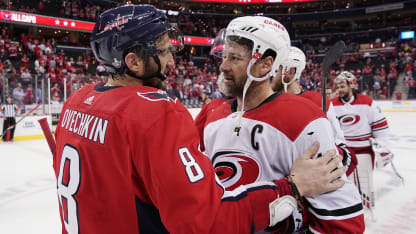The Capitals tied with the Toronto Maple Leafs for the League lead with seven players who scored at least 20 goals during the regular season: forward Alex Ovechkin (51), forward T.J. Oshie (25), forward Jakub Vrana (24), forward Tom Wilson (22), Backstrom (22), forward Brett Connolly (22) and center Evgeny Kuznetsov (21). But that depth did not materialize against the Hurricanes.
Though Ovechkin (four goals, five assists) and Backstrom (five goals, three assists) carried the load on the top line with Wilson (three goals, two assists), Washington didn't get enough offensive production from its other lines. Losing Oshie (one goal, one assist) when he fractured his right clavicle in Game 4 didn't help.
Connolly scored two goals, one each in Games 5 and 6; Vrana had zero points; Kuznetsov had six points (one goal, five assists) but they all came in the Capitals' four home games. He never came close to being the impact player he was when he had a League-high 32 points (12 goals, 20 assists) in the Stanley Cup Playoffs last season.
"We weren't able to execute probably throughout our lineup as much as I would have hoped just in terms of our depth of scoring," Capitals coach Todd Reirden said.


















